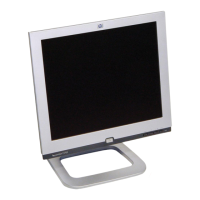
Do you have a question about the HP Pavilion F1703 and is the answer not in the manual?
| Brand | HP Pavilion |
|---|---|
| Model | F1703 |
| Category | Monitor |
| Language | English |
Lists key features: 15-inch TFT, 1024x768, VGA, True Color, pedestal, auto-adjustment.
OSD manager, power management, ENERGY STAR, low power, TCO '99, Plug & Play, security lock.
Lists key features: 17-inch TFT, 1280x1024, VGA, True Color, pedestal, auto-adjustment, OSD.
Low power, power management, ENERGY STAR, Plug & Play, security lock.
Lists monitor, cables, adapter, speakers, poster, warranty booklet, CD-ROM.
Instructions for connecting monitor power and video cables, includes caution.
Step-by-step guide for connecting and disconnecting monitor cables.
How to connect HP speakers to the monitor, detailing right speaker features.
Features and connections of the optional subwoofer.
Steps for connecting a two-speaker system without a subwoofer.
Instructions for setting up a two-speaker system with a subwoofer.
Detailed steps for connecting speakers and subwoofer to PC and each other.
Instructions to secure the monitor using a Kensington lock security cable.
How to tilt and adjust the monitor screen height for optimal viewing.
Step-by-step guide for installing monitor drivers on Windows 2000.
Step-by-step guide for installing monitor drivers on Windows Me.
Step-by-step guide for installing monitor drivers on Windows XP.
Further driver installation steps and reference to Windows documentation.
Explains the function of the five control buttons on the monitor.
How to use the auto-adjustment function and the included CD-ROM software.
Scenarios for adjusting settings: first install, graphics card change, etc.
Guide to navigating On Screen Display (OSD) menus for adjustments.
Details OSD menus: Brightness/Contrast, Image Control, Advanced, Information.
How to adjust position, clock, phase, contrast, and brightness via OSD.
Detailed steps for adjusting specific settings like position, clock, phase, contrast, and brightness.
How to adjust color tints (9300K, 6500K) and user color settings.
Step-by-step guide for adjusting Red, Green, and Blue (RGB) color values.
How to lock OSD settings, adjust timeout, and manage horizontal/vertical position.
Detailed steps for adjusting OSD timeout and horizontal/vertical screen positions.
How to use auto-configuration to reset position, clock, and phase for optimal image quality.
Restores original factory settings for color, brightness, phase, and clock.
How to change OSD language to English, Spanish, French, German, Italian, Chinese, or Japanese.
How to view serial number, resolution mode, and backlight working time for support.
Detailed steps to access and view monitor information through the OSD.
Steps to diagnose and resolve issues when the monitor has no picture and the light is off.
Solutions for missing pixels, impure colors, and off-center pictures.
Details acceptable defective pixel counts for the f1503 monitor.
Details acceptable defective pixel counts for the f1703 monitor.
Covers display size, type, input signal, interface, scanning frequency, and resolution.
Details power source, operating/storage environment, dimensions, and weight.
Covers display size, type, input signal, interface, scanning frequency, and resolution.
Details power source, operating/storage environment, dimensions, and weight.
Recommendations for maximizing lifespan and preventing damage, including cleaning instructions.
Discusses HP's commitment to the environment and product recycling programs.
FCC Class B statement regarding radio frequency interference and user instructions.
Declaration of Conformity for FCC marked products and contact information.
Statement regarding compliance with Canadian Interference-Causing Equipment Regulations.
Information on compliance with EU EMC and Low Voltage Directives.
Compliance with European norms (EN standards) and MPRII guidelines for emissions.
Specific regulatory notices for Korea, Germany, and Japan.
Guidelines for selecting and using appropriate power cords, including safety and length specifications.
Explains ENERGY STAR compliance and its benefits for energy efficiency and the environment.
Information about the TCO '99 standard for environmentally adapted electronics.
Details environmental demands like restrictions on heavy metals and energy requirements.
Discusses the presence and risks of flame retardants in electronic components.
Explains the presence and toxicity of Cadmium in electronics and TCO '99 requirements.
Discusses mercury in electronics and the prohibition of CFCs/HCFCs.
Explains the presence and toxicity of Lead in electronics and TCO '99 allowance.
